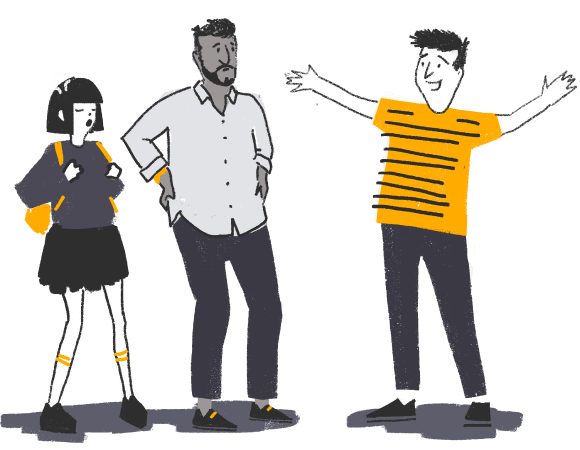On 4 July, a group of young boys thought that climbing to the top of Dead Man’s Cliff would be a thrill they would never forget. The climb was full of narrow paths and dagger-like rocks. They had precluded that the trek up to the cliff would be their only difficulty. The eldest and most courageous boy of the group reached the summit first. As the boy peeked over the edge into the water, his heart sank. “Is this the same cliff we had looked at from the water?” he thought to himself. Fear came over him as the other boys ran up behind him. “Jump, jump!” They shouted. He tried to speak, but nothing came out. Not wanting them to think of him as a coward, he stepped toward the edge. He had jumped from a small cliff in the past and knew very well what the consequences were if he landed wrong in the water. Heart throbbing, legs shaking, skin sweating, and lungs gasping, he prepared to take the plunge.
What the boy is experiencing is called fear. Fear is an unpleasant, often strong emotion caused by anticipation or awareness of danger. In the boy’s case, the danger of not landing in the water perfectly strait could cause him bodily harm. The words dread, fright, alarm, panic, and terror, are essentially all terms that express different levels of fear. Fear is the most general term and implies anxiety and loss of courage. When it comes to the definition of fear, many different versions of it exist, and all of them are true and resonate with people all of the world. Everyone on the face of the earth has experienced this emotion. Different elements bring fear to peoples mind. The fear of heights played a large role in the boy’s uncertainty in jumping. Some of the many fears people experience include: heights, death, abandonment, eternity, and ghosts.
The causes of fear that one may experience can be traced back to his earliest childhood memories. A painful experience on a bicycle may generate a fear of riding a bike for many years. A near drowning experience while learning to swim could make one fear the water for the rest of his life. When I was nine years old, I saw a horror movie about clown dolls. At night, the dolls would come to life and torture people. For five years after I saw that movie, I would have nightmares. Still to this day, I cannot sleep in a room that has a clown in it. Fear causes anticipation in one’s mind and an awareness of danger. A lot of people are afraid of spiders, and you will never force them to enter the room where at least one spider can be seen. Associating a physical or mental pain with an activity or object makes one have a fear of the dangers associated with it, and people find themselves in some kind of trance caused by that fear.
There are three different types of fear: superstitious, intelligent, and uncertainty. Superstitious fear is a fear of imaginary and make-believe things. The “monsters” in the closet are a fear that young children have. However, this type of fear is totally superficial. The television shows that a kid sees or the stories that are told to them by other siblings can cause their imagination to make up a creature that want to “get” them during sleep. Intelligent fear is one that comes as one gets older and gains more knowledge of the world around him. A girl that carries mace with her as she walks home through a bad part of town is scared of being raped or robbed. She is only fearful of getting raped or robbed because she has either read the newspaper, saw the case on the news, or hears about certain people who have been attacked in that part of the town. The fear of uncertainty is all about not knowing the outcome of one’s actions. The boy that was about to jump off the cliff was uncertain of whether or not he would land safely in the water. Also being uncertain of whether or not the water is deep enough plays a role in his uncertainty of the task. Fear is a natural emotion but having knowledge about one’s surroundings can give enough courage to face those fears with some confidence. And that little bit of confidence is what one needs to safely overcome the challenge.
Most people believe that fear is not a good feeling. There is no freedom, happiness, or admiralty in it. One can spend a lifetime trying to conquer all his fears and never triumph. However, that does not mean that one should not try. What is more, fear is not necessarily a completely negative issue! Being one of the inbuilt survival instincts that we all have, fear can actually be a good thing. For instance, when it comes to preparation and planning, it is fear that helps you to clearly see the distance between the goal that you’d love to achieve and where you are at the moment. Besides, fear stimulates people to identify their options and choices, consider and analyze them, as well as evaluate the most advantageous course of action. At the same time, fear helps people remove any sort of barriers. It forces you to ponder over both the imagined and real barriers that tend to keep you away from reaching your dreams and goals. The most common barriers that we encounter in everyday life include need to control everything, anxiety, fear of failure, inaction, defensiveness, uncertainty, not knowing how to handle different situations, overthinking of how things could be, and so on. Fear is the catalyst that makes people get out of their comfort zone and start taking small steps in order to break down the barrier and start living.
I read an inspiring quote a long time ago that read, “There can be no courage without fear and no success without courage.” Overcoming a fear will develop courage to take on more of life’s obstacles. The boy that was thinking about his decision to jump off that cliff had two options. One goes that he could try warming up on a smaller jump and progressively jumping higher. The second alternative would include simply jumping and risking personal injury. The first is the best way in overcoming one’s fears. By knowing the skills on the intermediate level first, one can safely move up to the more difficult advanced trials.
All in all, when people face fear at any point, the best decision that might work in such situation is to anticipate the rewards that they are going to get when they battle their fears. This, in turn, will serve as a motivation to push on. In other words, fear enables one to consider and weigh all the pros and cons of what it takes to be held back from stepping outside fear versus what it takes to move forward no matter what. Once you battle your fear, you will not only have an opportunity to breathe freely, but also encourage, motivate, and inspire other people to take action despite fear.





